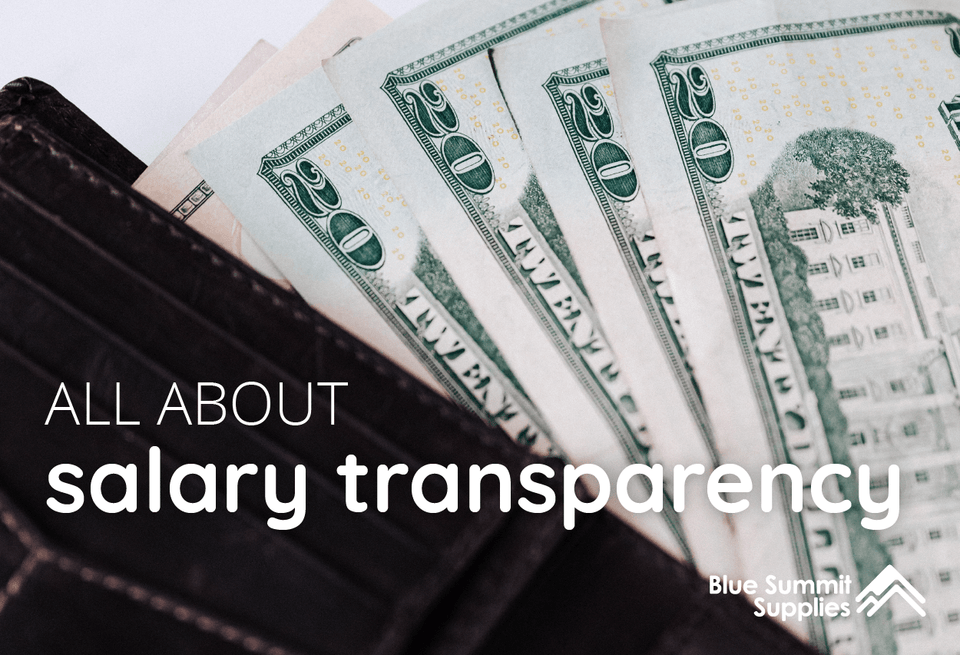Can you be fired for discussing salary or wages? The short answer is no, but it does get a little complicated if an employee is required to sign a salary non-disclosure agreement when they are hired. And even though an employer can’t fire you for discussing pay directly, they may get away with firing you for another indirect reason.
In this post, we’ll discuss the pros and cons of salary transparency and answer questions such as can you be fired for discussing pay, is it illegal to discuss wages, and what is a salary non-disclosure agreement?
The Pros and Cons of Salary Transparency
Salary transparency means that all wages and salary details are disclosed. This may mean they are disclosed internally to team members, or they are made publicly available online for all to see.
Remote company Buffer has been transparent for many years about current employee salaries and what new team members are likely to make based on their role and cost of living. They have an online salary database that’s continually updated and available for anyone to view online.
There are many pros and cons to salary transparency, but what’s most important is that businesses are clear about what’s expected. Whether for or against, a business must make it clear to its employees what best practices apply.
| Pros of Salary Transparency | Cons of Salary Transparency |
|
|
Etiquette Around Speaking About Pay
In a workplace lacking salary/wage transparency, carefully consider how and when you discuss pay. While you can’t be fired directly for discussing pay, you don’t want to make your teammates, clients, or customers uncomfortable.

If someone tells you their own salary, you should keep that information private. If a coworker discloses that information to you, it doesn't mean they want the rest of the organization to know how much they make. You can share your own payment details, but do not breach your teammates' privacy.
You should also refrain from talking about salaries or wages in front of clients and customers. This is unprofessional, and while you may not be fired for this directly, it will definitely look bad to your managers and employers who make decisions about future wages and progression within the company.
Can You Be Fired for Discussing Salary?
A salaried worker is paid a fixed amount of money by their employer every year, regardless of how many hours they actually work. In addition to receiving a fixed amount of money, salaried workers are also likely to receive benefits like health insurance and retirement plans.
An employee’s annual salary determines how much they make per week, but it can also become a status symbol and point of pride.

So, can you be fired for talking about pay? The answer is no. US Executive Order 11246 dictates that employees have the legal right to discuss and disclose their salary and ask other employees how much they earn—they cannot be fired or otherwise disciplined or retaliated against for doing so (though this order does not apply to religious schools or municipal governments.)
There is not, however, any legal mandate that requires employers to disclose their pay.
That said, the rules are different if you signed a salary non-disclosure agreement (more on that below) when you were hired. And even if you didn’t sign an agreement, you may be reprimanded in other ways or fired for a different reason entirely if your employer believes you are being disrespectful. For example, if an employer is choosing who they want to lay off, they may choose the employee who has been bragging about their salary and pressuring others to discuss theirs.
💡 What’s the Difference Between Being Terminated vs. Laid Off vs. Furloughed?
Can You Get Fired for Discussing Wages?
Wage workers, also known as hourly workers, are only paid for the exact hours they work. If an employee calls in sick or is sent home due to a lack of business, they won’t be paid for the hours they miss. On the other hand, if there’s plenty of business and the employee is asked to stay longer, they’ll be paid for each additional hour they work.
Wage workers are also protected under US Executive Order 11246, which makes it safe for people to ask about, discuss, and disclose their pay. “Pay” refers to any payments made to an employee, including but not limited to salary, wages, overtime pay, vacation and holiday pay, and more.
Again, this is technically what is allowed, but an employer may fire you for a different reason if they believe you are being disrespectful or making others in the workplace feel uncomfortable. For example, you may freely discuss your own pay, but it would be frowned upon if you disclose someone else’s pay or start rumors about what other teammates make. And if you signed a wage non-disclosure agreement, you are bound by that agreement not to discuss wages.

The difference between salary and wage is an important distinction. We covered this topic in more detail in our article: What’s the Difference Between Salary and Wage Professionals? It includes the rules around how and when salary and hourly workers are paid and pros and cons for employees and employers.
Is an Employer Obligated to Share Salary/Wage Information?
Employers are not bound in any way to provide information about their own pay. Even though they are not obligated to, doing so improves transparency in the workplace and prevents distrust from spreading. Salary transparency is a growing trend designed to put everything out in the open so that rumors don’t spread. In salary transparent workplaces, the pay of all employees, including managers and employers, is disclosed.

It’s also important to note that Executive Order 11246 doesn’t require employers to provide employees or job applicants with information on the pay of other employees or applicants. So while it is legal for employees to ask, it’s also legal for the employer to say no to disclosing that information.
Is it Illegal to Talk About Wages?
No, Executive Order 11246 mandates that it is legal for employees to talk about wages and salary. There are a number of extenuating circumstances and conditions to be aware of, however, such as whether or not you signed a non-disclosure agreement (NDA) with your employer when you were hired.
What is a Salary Non-Disclosure Agreement?
A salary non-disclosure agreement (NDA) prohibits an employee from being able to discuss or disclose their salary. If you signed one of these agreements, then you are forbidden from discussing your wage or salary with anyone but your employer.

According to the Harvard Business Review, over one-third of the US workforce is bound to an NDA. NDAs are designed to protect a company’s image by demanding employees remain silent about what goes on in their workplace. They feature expansive (and sometimes borderline ridiculous) definitions of what must be kept confidential during an employee’s time with the company and after their employment has ended.
Discrimination in the Workplace
Discussing pay based on potential discrimination in the workplace is not something you can be fired for, and if you are, you should seek legal help.
No one should be treated differently at work because of race, religion, sexual orientation, age, gender identity, etc. Learn more about Discrimination at Work and Signs You Need a Workplace Discrimination Attorney.
More from Blue Summit Supplies
💡 Ageism at Work: Managing Generational Differences in the Workplace
💡 How to Handle Intimidation at Work
💡 How to Congratulate Someone on a Promotion and Other Promotion Etiquette
We love helping businesses manage efficiency, team dynamics, and wellness. Follow our office supplies blog for the latest trends, strategies, product comparisons, and more.
If you have any questions or want to talk to someone about office supplies, send us an email or connect with us on Twitter, Facebook, or Instagram.
 For more informative articles about office supplies, subscribe to our email newsletter!
For more informative articles about office supplies, subscribe to our email newsletter!
Never fear, you won't begin receiving daily sales emails that belong in a spam folder. Instead, we promise a fun weekly roundup of our latest blog posts and great finds from across the web. And if you lose interest, it's always easy to unsubscribe with a single click.










